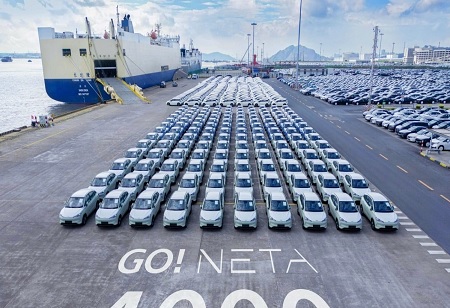
Hozon Targets Global Market with Hong Kong IPO Amid China's Price Wars

 Hozon New Energy Automobile, the start-up behind the Neta brand of electric vehicles (EVs), has filed for a capital raise in Hong Kong. This move aligns it with BYD, Xpeng, and Li Auto in leveraging the world’s fourth-largest stock market to finance its global expansion and move away from China’s competitive pricing environment. Hozon intends to utilize proceeds from its initial public offering (IPO) to support its strategy of expanding internationally, including establishing localized production facilities in various markets. The Shanghai-based automaker did not disclose the exact amount it seeks to raise.
Hozon New Energy Automobile, the start-up behind the Neta brand of electric vehicles (EVs), has filed for a capital raise in Hong Kong. This move aligns it with BYD, Xpeng, and Li Auto in leveraging the world’s fourth-largest stock market to finance its global expansion and move away from China’s competitive pricing environment. Hozon intends to utilize proceeds from its initial public offering (IPO) to support its strategy of expanding internationally, including establishing localized production facilities in various markets. The Shanghai-based automaker did not disclose the exact amount it seeks to raise.
Hozon is the latest company to jump at the opportunity to raise funds abroad after China’s securities regulator opened the floodgates in mid-April to support qualified industry leaders to raise capital in Hong Kong. As of June 18, 158 firms had obtained approvals for overseas listings, the China Securities Regulatory Commission’s vice-chairman Fang Xinghai said last week during the Lujiazui Forum in Shanghai. Among these, 85 are for Hong Kong and 73 are heading for the New York stock market.
Founded in 2014, Hozon has secured 26.4 billion yuan (US$3.63 billion) in venture capital across 11 funding rounds from 19 investors, as reported by Crunchbase. Its backers include Qihoo 360 Technology, a Chinese cybersecurity firm, Citic Securities, and BAIC-BJEV, an EV manufacturer backed by the Beijing municipal government. Last year, Hozon's losses widened by 3 percent to 6.9 billion yuan, following a nearly 40 percent increase in the previous year. The company's Neta budget electric vehicles, named after Nezha, the Chinese deity associated with drivers, are priced between 100,000 yuan (US$13,763) and 200,000 yuan.
According to a report, Hozon is poised to potentially raise up to US$1 billion in Hong Kong, marking it as one of the city's largest fundraising endeavors this year. By the end of last year, Hozon commenced vehicle assembly in Thailand at its inaugural overseas facility, aimed at penetrating the Southeast Asian market. The company announced the successful production of the first right-hand-drive model of its Neta V-II, an electric compact SUV, at its Bangkok plant in November, achieving this milestone approximately two months earlier than planned.
The factory, which it built along with its Thai partner, Bangchan General Assembly, has an annual capacity of 20,000 units. “Chinese carmakers are looking to accelerate their outbound moves to bolster sales as they face difficulties chasing high growth at home”, said Eric Han, a senior manager at Suolei, an advisory firm in Shanghai. “Hozon has opportunities in Southeast Asia where its low-priced cars are attracting local EV fans”.
In 2023, Hozon exported 17,019 vehicles manufactured in China, accounting for 13.7 percent of its total deliveries for the year. Currently, the majority of China's EV manufacturers are operating at a loss, with exceptions such as top players like BYD, the world's largest electric vehicle assembler, and Li Auto, Tesla's closest competitor in the Chinese market.

